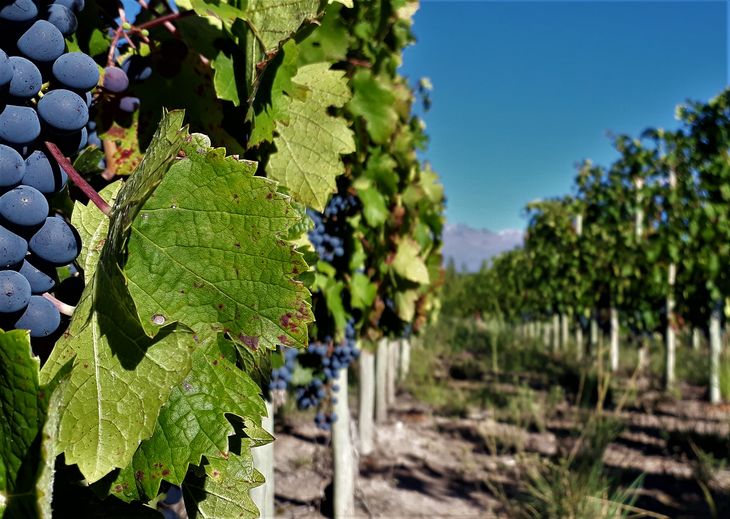With production levels that are unique in the world, the wineries expand throughout the country, but 86% are concentrated in Mendoza. It goes very well to accompany it with roast or a picadita with Roquefort cheese.
malbec wine.jpg
Pexels.
bonarda
Red wine with low tannin content. Bonarda is the second most widely planted variety in the country and is even considered by some to be the “new” Malbec, due to its enormous potential. The difference between the one found in Italy and the national version is that it has similar characteristics to the extremely rare Douce Noir grape, from the Savoie region of France.
Its production is also concentrated in Mendoza (in addition to San Juan). With an intense and dark color, we recommend combining them with some delicious meat empanadas.
wine glass_1200.jpg

Malbec, a variety that adapts to the different terroirs.
pixabay
Torrontes
Fresh, fruity white wine with low tannin content. While Malbec is the quintessential Argentine red, Torrontés is its white wine version. Unlike all the others, this grape is native to the country and is grown mainly in northwestern Argentina. There are even three types of Torrontés: Mendoza, San Juan and Rioja. Each one has its own characteristics, but the Rioja is the one that has been most consolidated in the market, with several international awards to its credit. From here we bank mix it with salty foods.
wine.jpg

Sustainable Economy
Cabernet Sauvignon
Elegant and subtle red wine, with robust and aromatic tannins. Considered the queen of vines (many of the great Argentine wines are made with it), Cabernet Sauvignon gained international relevance due to its easy adaptability. In Argentina, it is produced in the western provinces and, depending on your region, the aromas differ. More than ever, the phrase the older the better applies.
Wine Day.jpg

merlot
Soft red wine with aromatic complexity. Its production continues to be low but its quality is very high. In Argentina, the best wines come from the Uco Valley, in Mendoza, and from Patagonia, due to their elevated locations and cool climate. The ideal pairing is with roast beef with chimichurri.
WineCup.jpg

Pinot Noir
Fresh, acidic red wine with an earthy aroma. Pinot Noir is a variety that requires special care and a particularly cold climate to reach its full potential. Like Merlot, it is also produced in the Uco Valley, Mendoza, and in Patagonia. Dull reddish in color, we recommend accompanying it with a tasty chicken dish.
wines.jpg

syrah
Light, fresh red wine with a very strong aroma. He was born in Europe and ended up in South America. More precisely in the Valley of Tulum, in San Juan, and in the east of the province of Mendoza. It is also a good idea to combine it with grilled meats.
wine cellar.jpg

Tannath
Red wine with strong, fruity tannins and a lot of body. Considered the Uruguayan national wine, the Tannat variety, native to France, recently gained ground in Argentina (although it still has a low production in relation to the other wines). It hit very well in the province of Salta, due to the average and dry temperatures conducive to the long period of maturation of the grapes. We recommend enjoying it with marinated vegetables.
Wine cellar.jpg

Chardonnay
Fresh white wine, with low tannin content. If the Cabernet Sauvignon is the queen of the red varieties, the Chardonnay is the monarch of the white ones. In Argentina it ripens optimally and serves as the basis for producing a wide range of wines. Normally, it is produced in the province of Mendoza, in more temperate zones.
wines

Sauvignon-Blanc
White wine with a good body, notable acidity and aromas of tropical fruits. The French and voluptuous strain requires a lot of care and wisdom in its preparation. Due to its peculiar vegetative characteristic, it is little developed in Argentina. Concentrated in a few hectares of the country, its production in Mendoza also stands out. Serve as a great snack on hot days.
malbec wine 3.jpg

pexels
Source: Ambito
David William is a talented author who has made a name for himself in the world of writing. He is a professional author who writes on a wide range of topics, from general interest to opinion news. David is currently working as a writer at 24 hours worlds where he brings his unique perspective and in-depth research to his articles, making them both informative and engaging.




